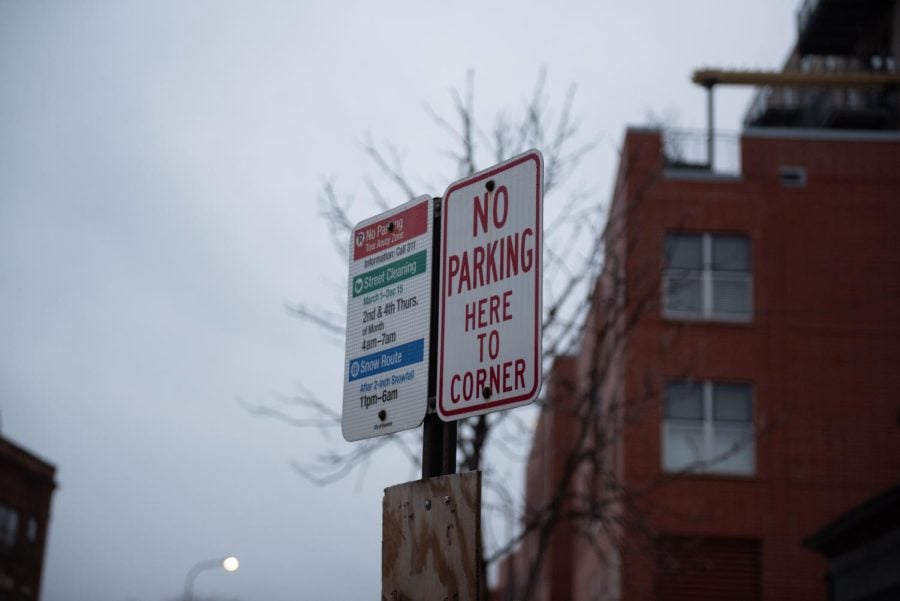Parking system drives visitors away from Downtown Evanston
Katie Chen/The Daily Northwestern
Some residents find Evanston parking signs unclear and difficult to follow.
February 8, 2023
Gary Schwartz, an Evanston resident for 54 years, said some parking meters don’t work when he inserts money. So he sent a written complaint to Ald. Thomas Suffredin (6th).
But after many emails to Suffredin and other officials, Schwartz gave up.
According to the city’s Parking Study Executive Summary, the “quaint community with a small town feel, is now urban and dynamic and, therefore, must adapt its parking policies, rates, and fees to accurately account for the growth it has experienced.”
On the community communication app Nextdoor, residents are voicing concern about ticketing, meter and signage issues with parking. Schwartz, like other residents, said Evanston’s parking system is pushing them towards places like Skokie’s Old Orchard and Lincolnwood Town Center, which he said have more functional meters and free parking. In an email to The Daily, Suffredin said he agrees with Schwartz but that not all his colleagues see the issue the same way.
The Park Evanston mobile app allows residents to pay for parking — prices ranging from $0.50 to $3.00 — remotely. However, residents on Nextdoor emphasized that this system should not diminish the option to pay at the meter.
Schwartz said he’d like to see experts help create better parking policies and a less punitive ticketing system. He said he wants Northwestern to contribute academic expertise in helping the city solve this issue.
“Evanston is a very progressive community (with) enlightened representatives at every level,” Schwartz said. “But the government provision of services is anything but that.”
A city study from last September stated the development seems to point to transit-oriented development, which aims to encourage public transportation options.
This city and pedestrian atmosphere is intended to attract more people and businesses.
In 2020, the city said it hoped to conduct a study on an improvement strategy for commercial areas, though it was delayed to 2022 due to the COVID-19 pandemic. Evanston’s findings were published in September and included a re-evaluation of vehicles and parking.
Jerry West, a former Evanston resident who now lives in Lincolnwood, said street cleaning sometimes affects parking schedules, making it difficult to interpret parking signage.
The city website confirms that streets are cleaned once a month, though additional cleaning is enforced in residential areas in the fall.
While visiting friends in Evanston, West said he noticed stickers sometimes cover permanent signs, listing conflicting times vehicles are allowed on the roads. This poses an obstacle to people who rely on a set parking schedule, he said.
“Are we supposed to get out and read every sign that goes up that somebody just sticks up there?” West asked.
Evanston resident Lucy Elam said she considers the controversy over parking “a lot of whining” — especially since without time regulations for residential parking, the streets wouldn’t be clean.
Elam said she’s found the city’s parking signs to be difficult to decipher. However, she said she’s seen an improvement in the clarity of the signs over the past few years.
“It didn’t matter if you had an IQ of 140 — there was no way you could make sense of signs for things like street cleaning,” Elam said. “The signs were not intelligible, but they’ve fixed some of this.”
Elam is currently subscribed to the city’s text message and email alerts for street cleaning and snow parking restrictions.
She said this form of communication has helped remind her not to park on the street during those days, ensuring she doesn’t get a ticket.
“I think the city is pretty responsive,” Elam said. “They’re trying to make the downtown area more pedestrian friendly, (which) I think is a good move.”
Update: This story has been updated to include comment from Ald. Thomas Suffredin (6th).
Email: ariawozniak2025@u.northwestern.edu
Twitter: @ari_wozz
Related Stories:
— City Council hears parking study suggesting raising parking rate
— City Council votes to add $1 first-hour parking fee in city garages, excluding Sundays


